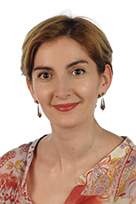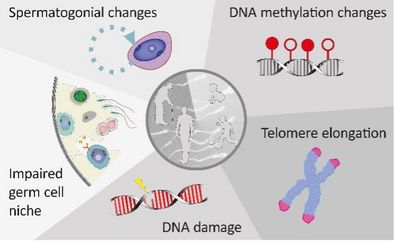
Dr. rer. nat. Sandra Laurentino
Scientist
Tel.: +49 (0)251 83-54830
E-Mail: Sandra Laurentino
Principal Investigator CRU326 Project 6
COST Action Andronet Science Communication Vice-Coordinator
Research Focus

The hallmarks of germ cell ageing in healthy men (Pohl, Gromoll, Wistuba, and Laurentino, Reproduction, 2021) 
My group focuses primarily on transcriptional and epigenetic (mostly DNA methylation) regulation in the germline and testicular somatic cells in humans. We are interested in how gene expression is regulated in different cell types, at different developmental stages, and what changes are associated with male infertility and ageing.
Fertility and ageing in the male
Contrary to females, males maintain their reproductive potential throughout the entire adult lifespan. Nevertheless, increasing age is associated with a reduction in male fertility and fecundity. In addition, advanced paternal age increases the risk of certain disorders in the offspring (paternal age effects, PAE). We found that, although ageing in healthy men is not necessarily associated with decrease in sperm parameters outside the normal range, sperm of older men presents abnormal levels of DNA damage and genome-wide epigenetic alterations. Within frame of a DFG-financed application, we are further evaluating molecular changes, especially in terms of transcription, DNA methylation, and DNA damage, to the human testis and sperm occurring with age in healthy men and that might be associated with age-associated subfertility and PAE.
DFG Project “Impact of ageing on the human male germline” (LA 4064/4-1). International collaborator: Prof. Guylain Boissonneault (University of Sherbrooke, Québec, Canada) PhD student: Yihan Wang, MSc.Gene regulation in male infertility
Most cases of male infertility are still diagnosed as idiopathic, i.e. unknown cause. We aim at identifying epigenetic and transcriptional changes occurring in the germline in cases of male infertility. In a DFG-funded project part of the CRU 326 “Male Germ Cells” in collaboration with Dr. Nina Neuhaus, we are using single cell RNA sequencing and methylome analysis to dissect the transcriptome and methylome of human germ cells in normal and infertile tissues.
CRU 326 “Male Germ Cells” Project 6 “Molecular mechanisms of spermatogenic failure at transcriptional and epigenetic level” (LA 4064/3-2) in collaboration with Dr. Nina Neuhaus (co-PI). PhD student: Lara Marie Siebert-Kuss, MSc.A Scheme of the testicular cell compositions of a representative group comparison for the analysis of differentially expressed genes (DEGs) between Sertoli cell only-syndrom (SCO) and spermatogonial arrest (SPG) phenotypes. B DEG expression across all patient groups. C Selection of genes with significantly increased expression in SPG samples. D Expression of new spermatogonial genes in our single cell RNA-seq dataset (Di Persio et al 2021, Cell Reports Medicine). E Protein expression of LUZP4 and TSPY4 highly specific for spermatogonia.
Male germ cell post-natal development in the human and the marmoset monkey
Testicular development and spermatogenesis and complex and tightly regulated developmental processes. In humans, the male germline remains quiescent until puberty, after which spermatogenesis begins and remains active throughout life. In a project financed by the IMF we are using the marmoset monkey as a model to evaluate transcriptomic changes in testicular somatic and germ cells throughout post-natal development using single cell RNA sequencing.
IMF Project “Mapping primate male germ cell development using single-cell transcriptomics” (LA112010) in collaboration with Dr. Nina Neuhaus (co-PI). PhD student: Juan Manuel Paturlanne, MSc.About me
I’m a biochemist by training with a PhD in Biomedicine. Spermatogenesis and the male germline have been my main research focus since I was a graduate student. I’m fascinated by transcriptional regulation in testis, particularly in epigenetic and hormonal control of gene expression. My work focuses on molecular changes to the male germline occurring not only during physiological processes such as development and ageing, but also in the case of sex chromosome alterations and male infertility. I use a range of tools to answer my study questions, namely next generation sequencing, single-cell and high resolution methods, and bioinformatics analyses. Outside of work, I enjoy relaxing activities like origami and reading.
Scientific career
Since 2/2012 Researcher at the Center of Reproductive Medicine and Andrology (CeRA), Münster, Germany 11/2011 Doctorate in Biomedicine by the Faculty of Health Sciences, University of Beira Interior, Portugal. Thesis: “Sexual Steroid Regulation of Spermatogenesis: New Actors Enter the Stage” 2007-2011 PhD Student at the Health Sciences Research Center, University of Beira Interior, supported by a PhD stipend from the Fundação para a Ciência e a Tecnologia, the Portuguese public funding agency for the support of science, technology and innovation. 2001-2006 Licenciatura degree in Biochemistry (pre-Bologna process) at the University of Beira Interior. Final thesis: “Study of the Expression of Androgen Receptor, Estrogen Receptors α and β and α-Inhibin and Localization of Androgen Receptor in Testicular Tissue of Infertile Men” Current grants

“Impact of ageing on the human male germline”
DFG full project (LA 4064/4-1)“P6: Molecular mechanisms of spermatogenic failure at transcriptional and epigenetic level”
DFG Clinical Research Unit 326 full project (LA4064/3-2), with Nina Neuhaus.“Mapping primate male germ cell development using single-cell transcriptomics”
Innovative Medical Research of the University of Muenster Medical School full project (LA112010), with Nina Neuhaus.

